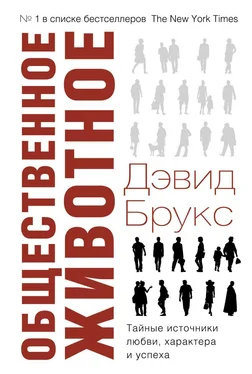Brizendine, 147.
Brendan L. Koerner, «Secret of AA: After 75 Years, We Don’t Know How It Works,» Wired, June 23, 2010.
Jonathan Haidt, «What Makes People Vote Republican,» Edge, September 9, 2008.
Jonathan Haidt, The Happiness Hypothesis: Finding Modem Truth in Ancient Wisdom (New York: Basic Books, 2006), 20-21.
Michael S. Gazzaniga, Human: The Science Behind What Makes Us Unique (New York: Harper Perennial, 2008), 148.
Jonah Lehrer, How We Decide (New York: Houghton Mifflin Co., 2009), 15.
Lehrer, 170.
Kwame Anthony Appiah, Experiments in Ethics (Cambridge, MA: Harvard University Press, 2008), 40-41.
Jean Hatzfield, Machete Season: The Killers in Rwanda Speak, trans. Linda Coverdale (New York: Farrar, Straus & Giroux, 2003), 24.
Paul Bloom, Descartes' Baby: How the Science of Child Development Explains What Makes Us Human (New York: Basic Books, 2004), 114.
Bloom, 122.
Liz Seward, «Contagious Yawn ‘Sign of Empathy,’» BBC, September 10, 2007.
J. Kiley Hamlin, Karen Wynn, and Paul Bloom, «Social Evaluation by Preverbal Infants,» Nature 450 (November 22, 2007): 557-59.
James Q. Wilson, The Moral Sense (New York: Free Press, 1997), 142.
J. J. А. Van Berkum et al, «Right or Wrong? The Brain’s Fast Response to Morally Objectional Statements,» Psychological Science 20 (2009): 1092-99.
Marc D. Hauser, Moral Minds: The Nature of Right and Wrong (New York: Harper Perennial, 2006), 60-61.
Jonathan Haidt and Craig Joseph, «The Moral Mind: How 5 Sets of Innate Moral Intuitions Guide the Development of Many Culture-Specific Virtues, and Perhaps Even Modules,» in The Innate Mind, eds. P. Carruthers, S. Laurence, and S. Stich (New York: Oxford, 2007), 367-91, and Jonathan Haidt and Jesse Graham, «When Morality Opposes Justice: Conservatives Have Moral Intuitions That Liberals May Not Recognize,» Social Science Research 20, no. 1 (March 2007): 98-116.
Jesse Graham, Jonathan Haidt, and Brian Nosek, «Liberals and Conservatives Use Different Sets of Moral Foundations,» Journal of Personality and Social Psychology 96, no. 5 (May 2009): 1029-46.
Hauser, 199.
Kyle G. Ratner and David M. Amodio, «N170 Responses to Faces Predict Implicit In-Group Favoritism: Evidence from a Minimal Group Study,» Social & Affective Neuroscience Society Annual Meeting, October, 2009.
Xiaojing Xu, Xiangyu Zuo, Xiaoying Wang, and Shihui Han, «Do You Feel My Pain? Racial Group Membership Modulates Empathic Neural Responses,» Journal of Neuroscience 29, no. 26 July 1, 2009): 8525-29.
Hugh Helco, On Thinking Institutionally (Boulder, CO: Paradigm Publishers, 2008), 98.
Ryne Sandberg, Induction Speech. National Baseball Hall of Fame and Museum, July 31, 2005.
Joshua D. Greene, «Does Moral Action Depend on Reasoning?», Big Questions Essay Series, John Templeton Foundation, April 2010.
Appiah, 160.
Jean В. Elshtain, «Neither Victims Nor Heroes: Reflections from a Polio Person,» in Philosophical Reflections on Disability, eds. Christopher D. Ralston and Justin Ho (New York: Springer, 2009), 241-50.
Donald Green, Bradley Palmquist, and Eric Schickler, Partisan Hearts and Minds: Political Parties and the Social Identity of Voters (New Haven, CT: Yale University Press, 2002), 12.
Green, Palmquist, and Schickler, 4.
Paul Goren, Christopher M. Federico, and Mild Caul Kittilson, «Source Cues, Partisan Identities, and Political Value Expression,» American Journal of Political Science 53, no. 4 (2009): 805-820.
Angus Campbell, Philip E. Converse, Warren E. Miller, and Donald E. Stokes, The American Voter (Chicago, IL: University of Chicago Press, 1980).
Larry М. Battels, «Beyond the Running Tally: Partisan Bias in Political Perceptions,» Political Behavior 24, no. 2 (June 2002): 117-150.
Joseph T. Hallinan, Why We Make Mistakes: How We Look Without Seeing, Forget Things in Seconds, and Are All Pretty Sure We Are Way Above Average (New York: Broadway Books, 2009), 44-45.
Joe Кеоhane, «How Facts Backfire,» Boston Globe, July 11, 2010.
Daniel Benjamin and Jesse Shapiro, «Thin-Slice Forecasts of Gubernatorial Elections,» Review of Economics and Statistics 91, no. 3 (2009); 523-26.
Jonah Berger, Marc Meredith, and S. Christian Wheeler, «Contextual Priming: Where People Vote Affects How They Vote,» Proceedings of the National Academy of Sciences 105, no. 26, July 1, 2008): 8846—49.
Ran R. Hassin, Melissa J. Ferguson, Daniella Shidlovski, and Tamar Gross, «Subliminal Exposure to National Flags Affects Political Thought and Behavior,» Proceedings of the National Academy of the Sciences 104, no. 50 (December 2007): 19757-61.
Mark Lilia, «А Tale of Two Reactions,» New York Review of Books, May 1998.
William G. Bowen, Martin Kurzweil, and Eugene Tobin, Equity and Excellence in American Higher Education (Charlottesville, VA: University of Virginia Press, 2005), 91.
«Britain is ‘surveillance society,’» BBC, November 2, 2006.
Phillip Blond, «Rise of the Red Tories,» Prospect, February 28, 2009.
James Q. Wilson, «The Rediscovery of Character: Private Virtue and Public Policy,» The Public Interest 81 (Fall 1985): 3-16.
Clinton Rossiter, Conservatism in America (Cambridge, MA: Harvard University Press, 1982), 43.
Marc Sageman, Understanding Terror Networks (Philadelphia, PA: University of Pennsylvania Press, 2004), 73-75.
Olivier Roy, Globalized Islam: The Search for a New Ummah (New York: Columbia University Press, 2004).
David Brooks, «The Wisdom We Need to Fight AIDS,» New York Times, June 12, 2005.
David Brooks, «In Africa, Life After AIDS,» New York Times, June 9, 2005.
David Brooks, «This Old House,» New York Times, December 9, 2008.
Daniel Drezner, «The BLS Weighs in on Outsourcing,» DanielDrezner.com, June 10,2004, and «Extended Mass Layoffs Associated with Domestic and Overseas Relocations, First Quarter 2004 Summary,» Bureau of Labor Statistics Press Release, June 10, 2004.
Читать дальше












